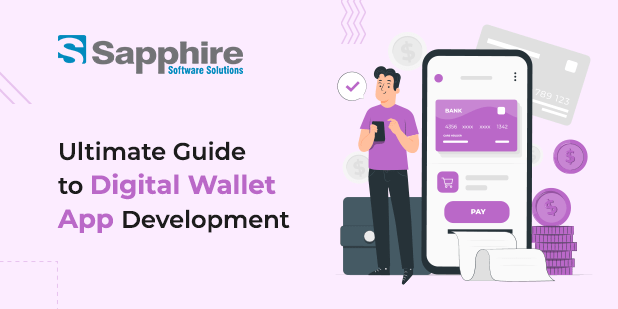Digital wallets, often known as mobile app wallets, are secure mobile payment systems that allow anybody to make money transfers. Digital Wallet app development promotes cashless payments and fast, location-independent money transfers.
Today, organizations work with Digital Wallet application development firms to provide mobile wallet app solutions that boost revenue and transactions. GlobeNewswire estimates that the worldwide mobile wallet industry will earn $46,006.0 million by 2028 and expand by 18.9% from 2021 to 2028.
The 2020 global digital wallet transaction market with 2021-2025 projections (in a million U.S. dollars)
Digital Wallet development has improved purchasing and selling, notably in eCommerce. UPI has streamlined bank-to-bank money transfers. Digital Wallet helps the business environment and makes significant revenues. This guide will help you construct a bespoke Digital Wallet mobile app by identifying the key components.
Types of Mobile Wallet Applications:
1. Closed Wallet:
Closed Digital wallets are built for a specific business, app, or website to complete online purchases. Organizations distribute these wallets to increase brand recognition and advertise goods and services to their target customers. A closed wallet may only be used for financial transactions with the wallet issuer. In the event of a refund, the reimbursement amount will be paid to the user’s Wallet. Amazon Pay and Ola Money are instances of closed wallets.
2. Semi-Closed Wallet:
Organizations sign and accept a mutually negotiated contract with the Digital Wallet provider to utilize the Digital Wallet apps’ services and capabilities. This allows merchants and business owners to conduct monetary transactions at indicated locations. Apple Pay and Venmo illustrate semi-closed Digital Wallets.
3. Open Wallet:
Open Wallet is the most popular sort of Digital Wallet on a worldwide scale since it facilitates single-platform online transactions. The sender and the recipient must have an account on the same Digital Wallet application to transfer and receive funds using this sort of application.
Industries that Invest in Digital Wallet App Development:
1. eCommerce Industry:
E-Commerce has proliferated and connected sellers and buyers. ECommerce transactions are safe and fast thanks to payment gateway integration. Mobile applications simplify ordering meals, home decor, and beauty and wellness. Digital Wallet app development increased corporate performance and consumer satisfaction.
2. On-demand food and grocery delivery:
Everyone knows the online food and grocery delivery sector is growing. This sector has boomed because of the convenience of home delivery of household goods. Digital Wallet development in grocery and food delivery applications has eased end-user payments. It helps them make money and provides customers with coupons.
3. Taxi Booking Apps:
Cashless is trendy. Digital Wallet in taxi booking app development lets passengers go cashless. After arriving, users may pay the anticipated fee using mobile wallets through UPI Id, QR code scanning, or cell numbers. Post-ride payments are rapidly Using Digital Wallets.
4. Online Bill Pay:
Customers adore this. Small to big businesses use online billing/payment systems and send reminders. The Digital Wallet app will notify consumers of outstanding payments and due dates even if they neglect to pay big invoices. It has made paying for the phone, power, credit card, and other payments easy with just a few clicks, eliminating the need to wait in line.
5. Ticketing Apps:
Market leaders like PayTM and Google Pay simplify ticket buying since consumers no longer want to wait in colossal window ticket waits. Digital Wallet application development in ticket booking applications boosts corporate growth and customer experience. Its ticket booking system offers 24/7 bookings and available payment.
Key Features to Incorporate in your Mobile Wallet:
1. Instant Payments between Wallets:
This functionality facilitates instantaneous money transfers between the payer and payee wallets. Users are not required to wait for specified hours or business days to complete transactions. This feature enables payment alternatives, rapid financing, and increased management of personal finances at any time and from any location.
2. Transfers between bank accounts:
Mobile wallets enable the easy transfer of funds from one bank account to any other bank account. Additionally, individuals may transfer funds to their accounts. The Digital Wallet smartphone app facilitates the transfer of funds across banks. Users need to provide specific information such as IFSC code and bank account number, then pick their bank.
3. Rapid Bill Payments:
People nowadays are more digital and want to pay all bills online. Whether it’s for loans, mortgages, mobile phone bills, credit cards, utility bills, etc., consumers like paying with eCash. With the mobile wallet app development idea, customers can easily make postpaid or prepaid bill payments.
4. Administration of Physical and Digital Card Operations:
Digital Wallet may save its customers’ credit/debit card information, which can be used to conduct monetary transactions anytime, anyplace. The development of the Digital Wallet has simplified client finances by consolidating their cards into a single platform. In addition, it removes the need to physically carry a card since it saves card information, such as card numbers, in an encrypted format and with rigorous security. Mobile wallets can handle numerous card procedures, such as PIN resets, account limits, card applications, etc.
5. Wireless Payment (via NFC or QR Code Scanning):
Clearly, in the present digital era, entrepreneurs eagerly anticipate incorporating new technologies that allow mobile wallet-based financial transactions. Using Digital wallets and contactless technologies such as QR-code scanning and NFC, retail customers may complete successful in-store purchases (near-field communication). Users may understand the barcode using the smartphone camera to scan the QR code. A mobile wallet must have NFC and QR code payment techniques to meet the rising demand for cashless payment.
6. Robust Data Protection:
Priority one when it comes to providing digital transaction services is strong security. Online monetary transactions must be protected by robust security measures such as security questions, end-to-end encryption, tokenization, biometrics, and one-time password (OTP) via text message. However, internet financial transactions provide more security than physically carrying cash, debit, or credit cards. Digital Wallet must have powerful features and end-to-end security capabilities to earn client loyalty. Before utilizing a mobile wallet, however, new users consider security concerns.
7. Simple and Quick Self-Registration:
The idea behind e-wallet app development is to save customers time and effort, so the app’s self-registration procedure should be streamlined and simple. Although registration is one of the most critical processes that have a lasting influence on the client experience, you must not avoid providing crucial values and data input forms. The one-time registration procedure should be simple and precise to maintain user engagement with your app.
8. Coupons, Rewards, and Discounts:
The effectiveness of discounts and prizes is not a secret to marketers and sales teams. Digital Wallets have become the optimal platform for providing these contextualized advantages to deal-seeking clients. Therefore, features that facilitate the production and management of coupons, discounts, tickets, loyalty points, etc., are essential for developing an e-wallet app to help your app stand out on the market.
9. Split Bill:
Simplifying people’s daily activities might be a competitive advantage for your Digital Wallet app. When it comes to contemporary amenities, splitting the price is a no-brainer. The bill split is an intriguing function that allows users to share the price for group meals, shopping trips, parties, etc. By choosing the friends’ phone numbers in the Digital Wallet app, sharing the cost with them is possible.
10. Analytical, graphical user interfaces:
Every consumer must maintain a record of their financial transactions regularly. Everyone must keep track of every dollar spent. Using charts, graphs, and numbers, Digital Wallet customers may monitor and evaluate their financial activities through an analytical dashboard. When consumers can see when and where they invest their money across all sources, including bank accounts and credit/debit cards, they can make more educated financial choices.
11. Integration of Chatbot:
A chatbot is a software application that communicates with end-users. When people are unavailable, chatbots assist consumers with using AI and NLP. The inclusion of a chatbot into your mobile Wallet app development offers new avenues for engaging your target audiences and enhancing customer support. Integrating a chatbot into your Digital Wallet app makes your services accessible 24/7 at a reduced cost. Consumers now expect an instantaneous reaction on all digital channels. Consequently, chatbots may be a valuable asset for enhancing customer satisfaction.
How to Calculate Digital Wallet App Development Cost?
Multiple variables determine Digital Wallet app development cost. Choosing in-house app development or a top mobile app development provider affects the entire Digital Wallet cost. If you want a firm with experienced and competent developers, these elements will decide the development cost.
1. Designing app:
Mobile app design is the key to consumer engagement. For intuitive Digital Wallet application development that offers flawless performance on every platform, including upcoming technologies, UI/UX app design trends, and expensive creative design components.
2. Built-in:
An app’s features and functions determine its Digital Wallet app development cost. If you design a simple app with few features, it may fit inside your budget. Complex features cost more.
3. Development Platform:
Mobile app development platforms can affect Digital Wallet development costs. Digital Wallet applications are primarily designed for iOS and Android. IOS Digital Wallet app development is cheaper than Android.
4. Stack:
Mobile wallet app development costs vary by the technological stack. Every technology has benefits and downsides. Before choosing the tech stack, employ a qualified mobile wallet app development business for solid architecture.
5. Developer Skills:
Whether you engage junior, executive, or senior developers for Digital Wallet development, their expertise, industry experience, and certifications will determine the pricing. Senior developers cost more than junior or mid-level developers with limited abilities and subject understanding.
Conclusion!
The proliferation of mobile wallet app development has caused a sea change in the industry. Although the internet and mobile banking have been present for quite some time, the introduction of Digital Wallet smartphone apps has made it simpler and more expedient to do online and offline business. By providing them with the ideal Digital Wallet app solutions, we assist companies in keeping up with current market trends and gaining a competitive edge.





































